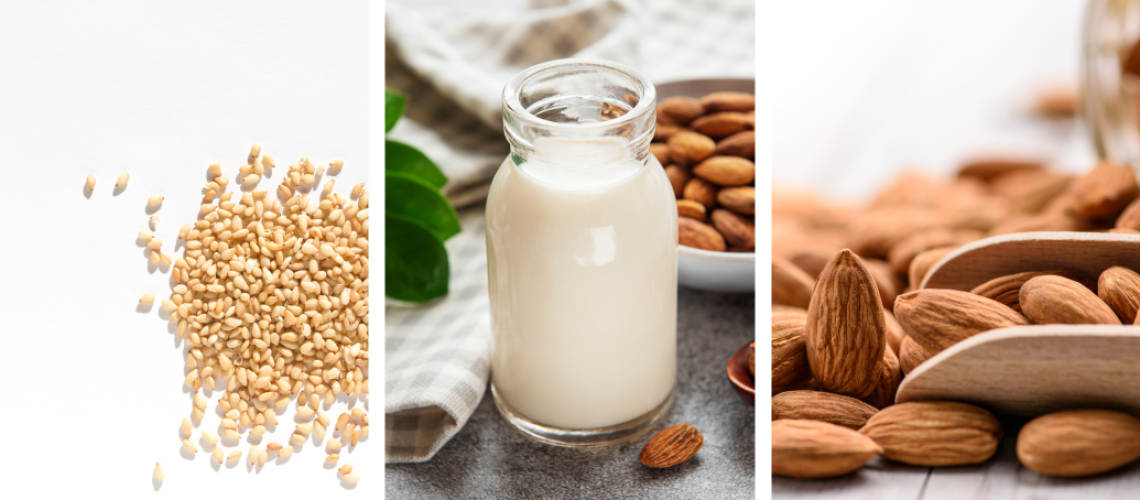This is one of my favourite homemade plant milks.
While the basic Almond Milk recipe already has many health benefits, adding sesame to the mix brings a whole lot more.
Sesame seeds are very high in calcium, magnesium, zinc and selenium, making this recipe very good for your bones and for your immune system
Like almonds, sesame seeds are also high in the amino acid tryptophan. Tryptophan gets turned into the feel-good neurotransmitters – serotonin and melatonin. These are important for our mental well-being, our happiness, our calmness and our cognitive function. Melatonin is also responsible for regulating our sleep cycle, so this milk can help you to get a good night’s sleep, often problematic in the menopausal and post-menopausal years.
Sesame seeds are high in fibre and protein, and they are also rich in mono and polyunsaturated fats, lignans and phytosterols – plant nutrients which have cholesterol-lowering effects. While dairy milk might raise your cholesterol, this milk will actively lower your cholesterol levels.
One of those lignans I just mentioned is called sesamin. Sesamin has been found to have an anti-inflammatory effect which can protect the cartilage that surrounds the knee joints and reduce the pain of arthritis.
Sesame seeds are also high in copper which is known for helping reduce pain and swelling in arthritis. So if you have arthritis, you definitely want to include more sesame seeds in your diet.
One study on post-menopausal women found that a regular intake of sesame reduced lipid (fat) levels, increased sex hormones and improved the antioxidant levels of these women.
So it’s all good news for sesame seeds so far.
However, to get these benefits, you do need quite a few sesame seeds, not just a sprinkle.
Sesame seeds are so tiny that they tend to get swallowed whole, and pass through the digestive system, emerging unchanged at the other end!
One of the less desirable things about sesame seeds is that they contain phytates, plant compounds that may hinder your absorption of calcium and other nutrients. We can reduce phytates by soaking nuts and seeds, which helps to draw phytates out of the seed, and then we throw away the water containing these pesky substances. That is why it is always important to soak your nuts and seeds before making your plant milk.
Soaking also helps to activate enzymes in the nuts and seeds which increase their nutritional value and make them easier to digest.
Watch the video below for more information about almond and sesame milk, plus a delicious smoothie you can make with it.
I hope you enjoy this recipe!
Ingredients
- 1 cup raw almonds
- 1/4 cup sesame seeds
- 4 cups water
- optional: vanilla extract, stevia or maple syrup
Method
- Rinse the almonds to get any dust off, and place in a glass or ceramic bowl. Add the sesame seeds. Cover with filtered water, cover and soak overnight in the fridge.
- Next morning, drain the soaking water and place nuts and seeds in a blender.
- Add 4 cups fresh water and blend as fine as possible. This usually takes about a minute with a high-powered blender like a Vitamix, Thermomix or Nutribullet.
- Place a large piece of muslin in a sieve over a large bowl, or use a nut milk bag if you have one.
- Pour the blended mixture in and allow most of the liquid to drain through.
- Here is the fun part! Gather up the edges of the cloth or nut milk bag, twist the top and squeeze the bag with your hands to extract the rest of the liquid. Keep squeezing until all you have left is a bag of dryish nut fibre. You can compost this or add it to cake mixtures or raw biscuits (use the same day, or dehydrate to store and use as almond flour).
- If you wish to sweeten the milk, add vanilla, a little stevia or a few drops of maple syrup.
- Bottle and store in the fridge. Use as fresh milk.






